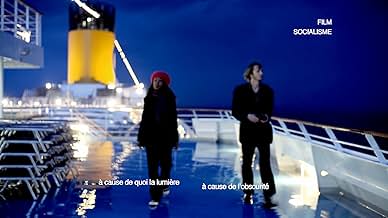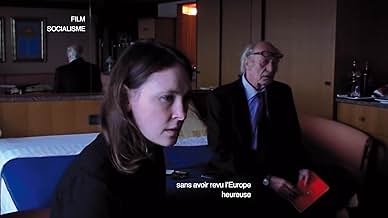AVALIAÇÃO DA IMDb
5,7/10
3 mil
SUA AVALIAÇÃO
Adicionar um enredo no seu idiomaThe passengers on a Mediterranean cruise enjoy their luxuries as a small family struggles with overbearing media attention.The passengers on a Mediterranean cruise enjoy their luxuries as a small family struggles with overbearing media attention.The passengers on a Mediterranean cruise enjoy their luxuries as a small family struggles with overbearing media attention.
- Direção
- Roteiristas
- Artistas
- Prêmios
- 5 vitórias e 2 indicações no total
Agatha Couture
- Alissa (segment "Des choses comme ça")
- (as A. Couture)
Mathias Domahidy
- Mathias (segment "Des choses comme ça")
- (as M. Domahidy)
Quentin Grosset
- Ludovic (segment "Des choses comme ça")
- (as Q. Grosset)
Maurice Sarfati
- (segment "Des choses comme ça")
- (as M. Sarfati)
Nadège Beausson-Diagne
- Constance (segment "Des choses comme ça")
- (as N. Beausson)
Dominique Devals
- (segment "Des choses comme ça")
- (as D. Devals)
Marine Battaggia
- Florine "Flo" Martin (segment "Quo vadis Europa")
- (as M. Battaggia)
Avaliações em destaque
Film socialisme (2010)
BOMB (out of 4)
How does one go about explaining Jean-Luc Godard's FILM SOCIALISME? I guess you could say that the director just throws at us various film clips. Some take place on a ship. Some take place in Egypt. Some just seem to be random shots of people walking around. Some are film in beautiful HD while others are filmed on what appears to be a very old cell phone. The subtitles are often full of mistakes. It could be that the words are put together to where it's hard to read them. It could be that the subtitles aren't really telling us what the characters are saying. Was there a point to this madness? I think there are two possibilities. One is that Godard wanted to drive people to suicide so he made this film. The other theory of mine is that he wanted to make a film so horrid that his followers would still rave about how great it was. Either way this here is a pretty worthless film and it's not that it's horrible because of a horrible filmmaker. No, it's horrible because the filmmaker knows he's making something that is nothing but a waste of time. The reason Godard does this is beyond me but sitting through this film is quite unpleasant and it makes one realize that this film is so bad that you couldn't even recommend it to those who love bad movies. I'm not going to lie and say Godard is one of my favorite filmmakers because he isn't. There have been highly respected films of his (like ALPHAVILLE) that I simply hated. With that said, I could see why some would be drawn to it. With this movie it's just pure garbage and I must admit that I find it funny reading so many reviews that call this a piece of art and one of the greatest films of the decade. Reading Roger Ebert's review states that Godard showed this film in a four-minute version by playing it with the fast-forward button on high. This here might have been the greatest idea the director ever had.
BOMB (out of 4)
How does one go about explaining Jean-Luc Godard's FILM SOCIALISME? I guess you could say that the director just throws at us various film clips. Some take place on a ship. Some take place in Egypt. Some just seem to be random shots of people walking around. Some are film in beautiful HD while others are filmed on what appears to be a very old cell phone. The subtitles are often full of mistakes. It could be that the words are put together to where it's hard to read them. It could be that the subtitles aren't really telling us what the characters are saying. Was there a point to this madness? I think there are two possibilities. One is that Godard wanted to drive people to suicide so he made this film. The other theory of mine is that he wanted to make a film so horrid that his followers would still rave about how great it was. Either way this here is a pretty worthless film and it's not that it's horrible because of a horrible filmmaker. No, it's horrible because the filmmaker knows he's making something that is nothing but a waste of time. The reason Godard does this is beyond me but sitting through this film is quite unpleasant and it makes one realize that this film is so bad that you couldn't even recommend it to those who love bad movies. I'm not going to lie and say Godard is one of my favorite filmmakers because he isn't. There have been highly respected films of his (like ALPHAVILLE) that I simply hated. With that said, I could see why some would be drawn to it. With this movie it's just pure garbage and I must admit that I find it funny reading so many reviews that call this a piece of art and one of the greatest films of the decade. Reading Roger Ebert's review states that Godard showed this film in a four-minute version by playing it with the fast-forward button on high. This here might have been the greatest idea the director ever had.
A Jean-Luc Godard double feature for me this evening. The first was Alphaville. This film, reported to be Godard's last, is a far cry from that.
It was shot entirely in digital, and the colors are breathtaking. It was meant to be seen in the theater, according to Godard, but I had to settle for video. There are numerous technical "glitches" in the film, and they were meant to be there.
Most of the film's text is in French with a smattering of German, Russian, Arabic, Hebrew, Latin, and Greek. Godard added subtitles in what he termed "Navajo English" at the bottom of the frame, which were as unhelpful as they were meant to be. The film is about a failure to communicate.
This is one of those films where the critics are far more enamored than the general populace. It is considered one of the top films of 2011 - almost the top ten. The people would disagree.
It was shot entirely in digital, and the colors are breathtaking. It was meant to be seen in the theater, according to Godard, but I had to settle for video. There are numerous technical "glitches" in the film, and they were meant to be there.
Most of the film's text is in French with a smattering of German, Russian, Arabic, Hebrew, Latin, and Greek. Godard added subtitles in what he termed "Navajo English" at the bottom of the frame, which were as unhelpful as they were meant to be. The film is about a failure to communicate.
This is one of those films where the critics are far more enamored than the general populace. It is considered one of the top films of 2011 - almost the top ten. The people would disagree.
Far to be a Godard admirer, I was real seduced by this film, a mix of cultural references about Mediteranean area, a good pledge for language as obstacle of understanding, eccentric, innovative, absurd in essence, proposing characters and theirs memories and believes , but not exactly a story.
A film about time and masks and past and facts as pieces of puzzle , it is a provocative invitation to viewer to create his explanations or - and doubts.
For me, the old watch is the main scene defining this film who remains a clash by fragments of doczmentary, stains of kitsch and rediscover of past. All, in essence, in the most honest manner.
A film about time and masks and past and facts as pieces of puzzle , it is a provocative invitation to viewer to create his explanations or - and doubts.
For me, the old watch is the main scene defining this film who remains a clash by fragments of doczmentary, stains of kitsch and rediscover of past. All, in essence, in the most honest manner.
Steve Pulaskie's negative review of "Film Socialisme" inadvertently, by its very length and detail, betrays the fascination a good Godard can exert even on the "unimpressed." I'll let the positive reviews -- not all of which I have read -- speak to my own liking for this film. I need to see it more times, especially after my French is more fluent than it is. But my take is that "Film Socialisme" is meant to provoke thought and questions, not answer them ... notwithstanding one can pick up a good notion of where Godard is coming from. But -- to echo any other reviews that have said the same -- "Film Socialisme" should NEVER be anyone's introduction to Godard! Whether or not it's really his last film, it comes 50+ years after his first films blew up the way everyone made movies ... and, yes, they even have plots. I have seen only a few of them, but am buying up more. The main IMDb web-page features a number of fans listing their top Godards; I refer newbies to them. By all means see "A bout de soufflé," "Une femme est une femme," "Alphaville," "Pierrot le Fou," "Band of Outsiders," and maybe "Weekend" -- and only then try "Film Socialisme." But this last film shows me Godard hasn't lost a thing he started with. He still has all his outrageous playful inventiveness, exuberant effrontery: he still makes a movie MOVE; this film is more CINEMA than the most CINEMA flick he ever tossed off. See the early ones -- on which his rep will always rest -- then re-see this one. Whether you like "Film Socialisme" or not, you'll know what I mean.
We recently screened Godard's contentious "Film Socialisme" at a small art-house cinema in Boulder, CO where I live and I couldn't be more delighted by the response. Namely, there were many people who were infuriated about the film, leaving in droves and upset that such a film both exists and/or would be shown at said theater (the only art-house theater in the city, actually).
One patron was even angry enough to leave a note behind for the concessions stand stating that she "speaks French" and was particularly upset about the subtitles of the film. She'd probably be the kind of person to get upset about the "punctuation problems" in ee cummings' poems. And don't get her started on Andy Kaufman!
First and foremost, "Film Socialisme" is without a doubt a beautiful film. The way in which it was shot and edited is visionary, a true patchwork of modern/post-modern society/cinema today. The kind of film that -- as with the majority of Godard's ouevre -- may be ahead of its time but will certainly be enjoyed by sincere cinephiles looking for something new, bold and fresh. Beyond any sense of provocation, there were true moments of visual/audio splendor that simply cannot be seen anywhere else (by sheer merit of the fact that, yes I agree, no one else would be "allowed" to make/distribute such a film; and that in itself is important when considering whether or not you should spend the money/time on seeing it in the theater).
Clearly, the subtitles of the film -- which are minimalist and fractured (clearly intentionally) - - are a play on one of the film's many themes: the breakdown of communication and language (think Gertrude Stein texting you viz. her thoughts on modern society). That people are growing angry about the challenging and innovative way Godard has aptly chosen to play even now with the very subtitles of his film is extremely exciting. Not to mention the fact that, again, aside from the "gimmick," the subtitles become a poetic innovation unto themselves in which Godard combines words into fascinating portmanteaus that invoke clever wordplay a la some of the greater avant-garde/surrealist literature.
He has finally gone that extra distance in deconstructing every aspect of the film (including, at times, a brilliant dalliance with the audio mix that clearly has confounded viewers a la similar experiments by the likes of the Velvet Underground, Andy Warhol, Andy Kaufman and La Monte Young; there are moments in which you truly wonder whether or not there is an "actual" breakdown of the film being shown -- especially if you're lucky enough to see this film through digital projection; "Is there something wrong with the disc?! Oh no!!" Very exciting. Audience interaction, indeed!)
Ultimately and as per Godard's typical (?) MO, the film is a firm lashing of the perpetuated bourgeois culture (particularly in America; hence his giving us the finger for not knowing French or the many other languages interspersed throughout the polyglot film; "You don't want to learn another language? Fine. Try figuring THIS out!!")
Like Lenny Bruce and a younger John Waters, with "Film Socialisme" Godard is shaking up audience members -- particularly his "greatest fans" -- by provoking them in ways they may not be comfortable with, in ways that may simply repel them. "You want to be shocked? I'll shock you, but be prepared to be, well c'mon: shocked." We don't go to Godard films to watch a clear narrative or to understand everything that happens. It's poetry, it's visual/audio artistry, it's -- ultimately -- play and experimentation. And Godard has once again succeeded in creating something that will not allow us to remain static in our seats. If you can't handle that, he is saying as always, then feel free to leave and don't forget to ask for a refund on your way out.
The megaplex is right down the street. Or, hey, buy a copy of "Breathless" and watch a nice "really weird and wild!!!!" noir film with a plot. It's all up to you!
In the end, the film defies quotation marks. If you want "challenging," you've got plenty of it on Netflix. If you want challenging, however, see "Film Socialisme." Just don't be too upset if it... challenges you.
One patron was even angry enough to leave a note behind for the concessions stand stating that she "speaks French" and was particularly upset about the subtitles of the film. She'd probably be the kind of person to get upset about the "punctuation problems" in ee cummings' poems. And don't get her started on Andy Kaufman!
First and foremost, "Film Socialisme" is without a doubt a beautiful film. The way in which it was shot and edited is visionary, a true patchwork of modern/post-modern society/cinema today. The kind of film that -- as with the majority of Godard's ouevre -- may be ahead of its time but will certainly be enjoyed by sincere cinephiles looking for something new, bold and fresh. Beyond any sense of provocation, there were true moments of visual/audio splendor that simply cannot be seen anywhere else (by sheer merit of the fact that, yes I agree, no one else would be "allowed" to make/distribute such a film; and that in itself is important when considering whether or not you should spend the money/time on seeing it in the theater).
Clearly, the subtitles of the film -- which are minimalist and fractured (clearly intentionally) - - are a play on one of the film's many themes: the breakdown of communication and language (think Gertrude Stein texting you viz. her thoughts on modern society). That people are growing angry about the challenging and innovative way Godard has aptly chosen to play even now with the very subtitles of his film is extremely exciting. Not to mention the fact that, again, aside from the "gimmick," the subtitles become a poetic innovation unto themselves in which Godard combines words into fascinating portmanteaus that invoke clever wordplay a la some of the greater avant-garde/surrealist literature.
He has finally gone that extra distance in deconstructing every aspect of the film (including, at times, a brilliant dalliance with the audio mix that clearly has confounded viewers a la similar experiments by the likes of the Velvet Underground, Andy Warhol, Andy Kaufman and La Monte Young; there are moments in which you truly wonder whether or not there is an "actual" breakdown of the film being shown -- especially if you're lucky enough to see this film through digital projection; "Is there something wrong with the disc?! Oh no!!" Very exciting. Audience interaction, indeed!)
Ultimately and as per Godard's typical (?) MO, the film is a firm lashing of the perpetuated bourgeois culture (particularly in America; hence his giving us the finger for not knowing French or the many other languages interspersed throughout the polyglot film; "You don't want to learn another language? Fine. Try figuring THIS out!!")
Like Lenny Bruce and a younger John Waters, with "Film Socialisme" Godard is shaking up audience members -- particularly his "greatest fans" -- by provoking them in ways they may not be comfortable with, in ways that may simply repel them. "You want to be shocked? I'll shock you, but be prepared to be, well c'mon: shocked." We don't go to Godard films to watch a clear narrative or to understand everything that happens. It's poetry, it's visual/audio artistry, it's -- ultimately -- play and experimentation. And Godard has once again succeeded in creating something that will not allow us to remain static in our seats. If you can't handle that, he is saying as always, then feel free to leave and don't forget to ask for a refund on your way out.
The megaplex is right down the street. Or, hey, buy a copy of "Breathless" and watch a nice "really weird and wild!!!!" noir film with a plot. It's all up to you!
In the end, the film defies quotation marks. If you want "challenging," you've got plenty of it on Netflix. If you want challenging, however, see "Film Socialisme." Just don't be too upset if it... challenges you.
Você sabia?
- CuriosidadesThe film did not include traditional English language subtitles for releases in countries that spoke such language. Instead, the subtitles were in "Navajo English", a translation that baffled many critics and audience members.
- Erros de gravaçãoSomeone claims that Napoleon founded the Comédie-Française in 1812 in Moscow. Actually, it was founded in 1680 by Louis XIV.
- Citações
Rebecca (segment "Des choses comme ça"): [dialogue continuity] You're absolutely right: I don't love any "people." Not French, not North American, not German. Not Jewish people, not black people. I love only my friends... When there are any.
- ConexõesEdited from O Encouraçado Potemkin (1925)
- Trilhas sonorasMamita mia
Performed by Ernst Busch
Principais escolhas
Faça login para avaliar e ver a lista de recomendações personalizadas
- How long is Film socialisme?Fornecido pela Alexa
Detalhes
- Data de lançamento
- Países de origem
- Central de atendimento oficial
- Idiomas
- Também conhecido como
- Film socialisme
- Locações de filme
- Empresas de produção
- Consulte mais créditos da empresa na IMDbPro
Bilheteria
- Faturamento bruto nos EUA e Canadá
- US$ 42.925
- Fim de semana de estreia nos EUA e Canadá
- US$ 4.526
- 5 de jun. de 2011
- Faturamento bruto mundial
- US$ 222.079
Contribua para esta página
Sugerir uma alteração ou adicionar conteúdo ausente

Principal brecha
By what name was Filme Socialismo (2010) officially released in India in English?
Responda























